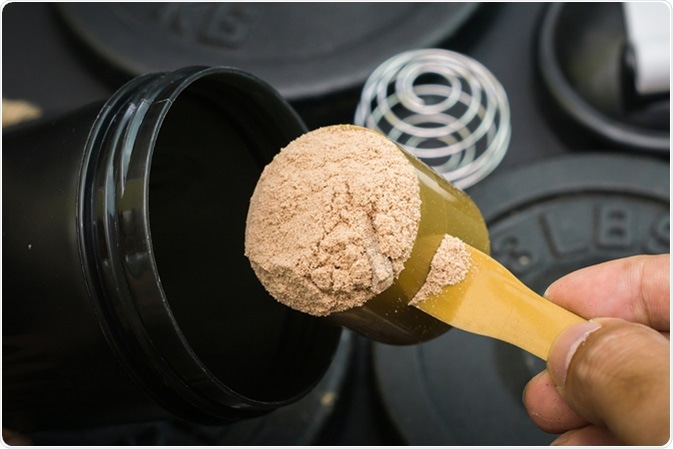Besides a balanced diet, many individuals opt to include supplements as part of their daily food intake. Protein powder is one such supplement which has become increasingly popular over recent years, with many users who want to achieve weight loss and muscle growth.
What role does protein play in the body?
Proteins are substances that contain nitrogen and are formed by amino acids. They are integral to all body structures including bone, muscle and other soft tissue. They are also essential to all body functions, which involve the synthesis and activity of multiple proteins such as hormones, enzymes and hemoglobin.
Proteins take part in a variety of anabolic processes within the body, and due to this many athletes or those who work out regularly believe that training at a higher intensity requires the intake of a higher amount of protein.
In order to gain additional protein and maximize muscle growth, many supplement their diet with protein powder.
What is protein powder?
There are three main types of protein powder, based on whey, soy and casein protein, with whey protein being preferred by most due to its being a complete and water-soluble protein. For vegans, soy protein powder is often consumed because it meets their dietary requirements.
When choosing a protein powder, there are many factors to consider, and potential implications. It is important to make sure that the protein powder is suitable for the needs of the individual.

Whey protein powder. Image Credit: Petejerkk / Shutterstock
How does protein powder affect muscle growth?
If protein powder is used as a supplement for muscle growth, the individual might need to consider what type of protein powder to consume. Whey protein contains a high concentration of branched chain amino acids, which are essential for the maintenance of healthy tissue.
Research shows that the consumption of whey protein stimulated muscle growth by 68% compared to 31% following the ingestion of casein.
Do Protein Shakes Work? | Earth Science
Efficiency in nutrient supply
Protein powder produced from casein is possibly the best option when nutritional efficiency is the aim. Characterized as a large colloidal particle or micelle, casein forms a clot or gel in the stomach. This is an attractive property as the clot can provide a slow and sustained release of amino acids into the bloodstream over several hours. This can result in higher nitrogen retention and utilization within the body.
Can protein powder aid weight loss?
For those who want to pursue weight loss, whey and casein may be superior to soy. In humans, protein is thought to contribute to satiety more than carbohydrates. When investigating the impact of whey and soy protein on appetite suppression, it is clear that those who consumed whey had less appetite.
This could be beneficial to those wanting to lose weight. Furthermore, the formation of a casein clot formation prolongs intestinal transit time, which may also decrease the appetite, and hence the food intake.
Is the sugar content in protein powder an issue?
Some protein powders may contain added sugar in order to improved taste. For those with type 2 diabetes, this is another factor to consider. Additionally, there is not much solid evidence as to the impact of protein powder consumption on insulin levels.
One study found that whey protein powder led to an increase in insulin levels after ingestion, but not casein.
How does protein powder affect acne?
Research has found a link between then use of protein powder and the onset and flare-up of acne, a common skin condition. Research investigating the impact of whey protein powder on acne in athletes concluded that its regular use was associated with aggravation of acne. Whey is derived from cow’s milk and milk is one of the best-studied triggers of acne.
Dairy product consumption can result in higher sebum synthesis which may lead to the blockage of hair follicles, producing acne outbreaks. Due to this, acne patients are recommended to use a protein powder that is free of milk protein.
There are many other factors to consider when choosing a protein powder, from dietary requirements to the impact on skin conditions and pre-existing medical issues.
Further Reading
Last Updated: Jan 15, 2019